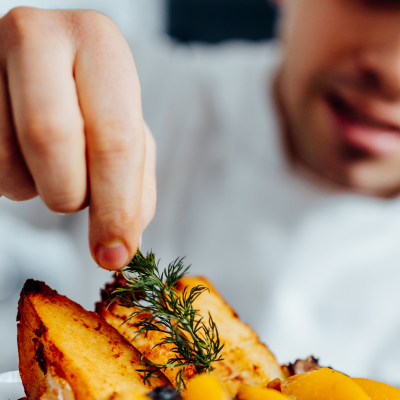Line Cook Program
Duration: 9 weeks
Prerequisite: Required
Pre-assessment: Required
January 2024

What does a Line Cook do?
A line cook is like the chef’s right-hand person in a restaurant kitchen. They have a specific job, like working the grill or frying station. Their main tasks are to measure ingredients, follow recipes, and make sure the food looks and tastes great. Line cooks need to be organized, work fast, and pay close attention to details. Teamwork is crucial because they have to coordinate with other kitchen staff to keep everything running smoothly. They also help with preparing food, keeping things clean, and making sure everything is safe and hygienic.
What does the Line Cook program include?
The 9-week Line Cook program is a comprehensive training initiative designed to equip aspiring line cooks with the essential skills and practical experience needed for success in a professional kitchen. The program covers a range of topics, starting with an introduction to line cook responsibilities, kitchen basics, and safety practices. Participants will learn to identify and use common kitchen tools and equipment, organize workstations efficiently, and develop crucial knife skills and food preparation techniques. Emphasis is placed on ingredient handling, food safety principles, and a deep understanding of menu items and recipes. The curriculum delves into various cooking methods, station responsibilities, and the art of timing, coordination, and plating. Practical training includes hands-on experience in a simulated kitchen service, allowing participants to execute orders, collaborate with fellow cooks, and manage station responsibilities under supervision. The program concludes with evaluations, certifications, and discussions about potential employment opportunities and career pathways in the culinary industry
Course Modules Outline:
• Understanding the role and responsibilities of a line cook in a professional kitchen.
• Introduction to basic kitchen etiquette, safety, and hygiene practices.
• Identification and use of common kitchen tools and equipment.
• Setting up and organizing workstations for efficiency.
• Developing knife handling skills and various cutting techniques.
• Basic food preparation techniques including chopping, slicing, and dicing.
• Understanding ingredient storage and handling procedures.
• Principles of food safety and sanitation in a commercial kitchen.
• Familiarization with the menu items and recipes in the kitchen.
• Understanding recipe comprehension and following kitchen procedures.
• Introduction to various cooking methods and techniques.
• Understanding specific station responsibilities in a line kitchen setup.
• Techniques for timing and coordination of different dishes.
• Understanding the art of plating and presentation.
• Hands-on experience in a simulated kitchen service under supervision.
• Practice in executing orders, coordinating with other cooks, and managing station responsibilities.
• Review of the course material through written and practical assessments.
• Discussion about career pathways and potential opportunities as a line cook in the culinary industry.

